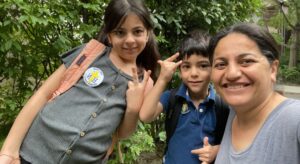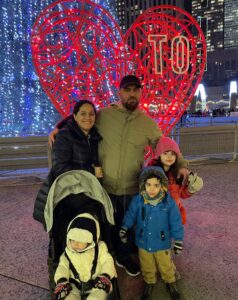 Zinah and two of her kids, 2022 (Photo provided by Zinah)
Zinah and two of her kids, 2022 (Photo provided by Zinah)
By: Maria Jose Lopez Sotelo
“It’s hard for me. I don’t have the language (…)”
Zinah, an Iraqi refugee in Canada, fled her home country when the war broke out. She left everything behind in search of greener pastures but when she arrived she was met with more struggles due to the fact that neither she nor her husband spoke English.
“Refugees are falling through the cracks because the system is setting them up for failure” – Hanna
The lack of knowledge impacted her life the most when she gave birth to her son. After only 4 months of pregnancy, Zinah had to rush to the hospital to deliver her baby boy. She could not understand what the doctors were telling her, and the hospital she attended did not provide interpreters. Fortunately, she contacted her sponsor, who acted as an interpreter at the time.
The Importance of Communicating
According to Hanna, a close friend of Zinah who acts as her interpreter and dedicates her life to helping refugee families from Arab countries, “There is a lack of accessibility in the system for newcomers to Canada. They need a support system; in addition, information is so fragmented that no one alone is able to find things if they don’t have the language skills necessary”
In Canada, protected people may take Language Instruction for Newcomers to Canada (LINC) classes at no cost, these courses are funded by the Federal government. Zinah says that even if they are useful for everyday conversation “ they only teach us about things like Christmas and thanksgiving”.
Currently, Zinah is working a minimum-wage job and is the sole provider for her family. Her husband got into a car accident which made him not be able to work. When he was at their community hospital, once again no interpreters were not provided and Hanna had to act as an interpreter for the family in order for them to understand what was going on and the steps they had to take.
“It’s a challenge for refugees (…) who don’t speak the language and can’t navigate the system. I feel there should be a way to revamp the whole system. Even with language classes, it’s not motivating for people to learn a new language, it would be helpful if it was attached to an apprenticeship program in which people do both, learn a skill and better their understanding of English” Says Hanna.
Immigration in Numbers:
- 431,645 New Permanent Residents in 2022
- Roughly 75% of the population growth in Canada comes from immigration
- More than 10 thousand approved asylum claims in Ontario in 2022
- The number of immigrants that sponsorship agreement holders (SAHs) increased to 13,500 this year.
- Canada is working on achieving the goal of welcoming more than 80 thousand privately sponsored refugees by 2025
The light at the end of the tunnel
Even though the biggest struggle Zinah has faced in Canada has been the language barrier, Zinah’s tenacity and resilience have helped her better herself and advance in life. She studied to level three English with LINC and ESL lessons and she enrolled in George Brown University where she completed level six in English.
Zinah assures that once her husband is able to work again she will go back to school to finish her English courses and maybe enroll in another program.
“My dream was to be a nurse, and I would like to study it someday (…) I will not stop until I get a good job that makes me happy. I hope that I can buy a house for my kids to play in. I want us to be happy, that’s the most important thing”
Podcast

Be the first to comment